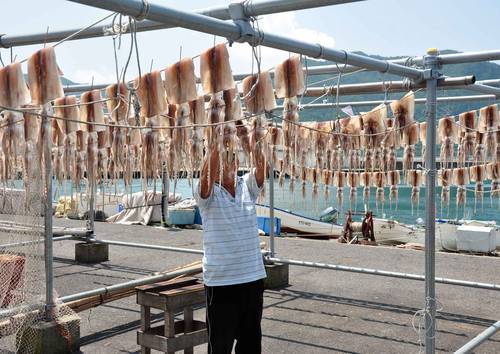
©UNESCO/Patrick McKeever Squid from San'in Kaigan Global Geopark, Japan,
is fished sustainably and sold as a product of the Global Geopark.
Learning from nature’s wisdom can help us address the critical challenges we face today, explained Professor Reiko Kuroda, member of the Scientific Advisory Board of the UN Secretary-General, in her keynote presentation at the 4th Asia-Pacific Geoparks Network Symposium in San’in Kaigan Global Geopark, Japan.
Professor Kuroda highlighted the importance of international collaboration and strong linkage between science and society to address global issues such as climate change, the depletion of our energy sources, managing freshwater sustainably and the growing world population – as well as to reduce natural disasters-related risks. This year is crucial, with the adoption of new Sustainable Development Goals in New York this month and the Paris Climate Conference (COP21) taking place in December. She also addressed the role of scientific advice in policy making and how to nurture the global citizen of tomorrow in light of the rapid scientific advancements of today.
Reiko Kuroda’s current research focuses on chirality, covering a wide area including solid-state chemistry, crystallography, chiroptical spectroscopy, as well as molecular and developmental biology. In 2013, she was awarded the l’Oréal-UNESCO Award ‘For Women in Science’ for her scientific achievements. She is one of 26 eminent scientists comprising the Scientific Advisory Board of the UN Secretary-General. The central function of the Board is to provide advice on science, technology and innovation (STI) for sustainable development to the Secretary-General and to the UN system. Established by UNESCO on behalf of Ban Ki-moon, the Board brings together the collective capacity of all relevant scientific fields, with due regard to social and ethical dimensions of sustainable development.
She gave her keynote presentation “Living with Nature: With wisdom from Nature” on the occasion of the 4th Asia-Pacific Geoparks Network Symposium held in San’in Kaigan Global Geopark from 16 to 20 September 2015 under the theme “Geoparks: Networking and Society”.
A Global Geopark is a unified area with geological heritage of international significance, which use that heritage to promote awareness of key issues facing society in the context of the dynamic planet we all live on. They hold records of past climate change and build on that knowledge to educate on current change and promote best practises on renewable energy and employing the best standards of “green tourism”. UNESCO provides support to Global Geoparks through the Global Geoparks Network.
Together with symposium participants, Reiko Kuroda visited several geosites in San’in Kaigan Global Geopark. San’in Kaigan is home to a diversity of geological sites related to the formation of the Sea of Japan, including granite outcrops formed when Japan was part of the Asian continent (70 million years ago), as well as sedimentary and volcanic rocks accumulated when Japan rifted away from Asia (25 to 15 million years ago) to form the Sea of Japan, a geological process still on-going today. As the region has experienced three large earthquakes, there are disaster-related geosites as well, such as reconstruction heritage sites and fault displacement, which serve as educational material on natural disasters.
